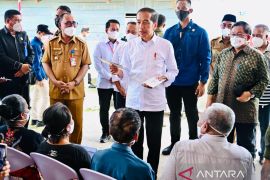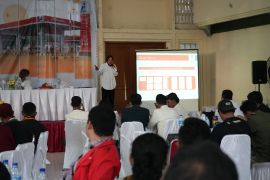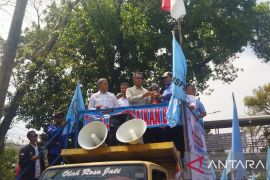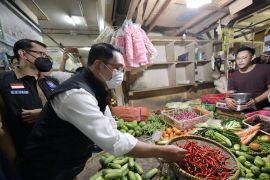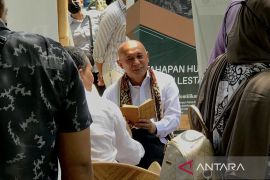The government needed the approval through the House`s endorsement of its Draft Revised 2013 State Budget (APBN-P) in which it was preparing compensation for the poor who would be affected by the fuel price hike policy.Jakarta (ANTARA News) - The previous discourse which had it that the government would have raised subsidized fuel oil price last May did not come true because the government was still waiting for approval from the House of Representatives.
The government needed the approval through the House`s endorsement of its Draft Revised 2013 State Budget (APBN-P) in which it was preparing compensation for the poor who would be affected by the fuel price hike policy.
Minister of Mines and Mineral Resources Jero Wacik reportedly said last week that fuel oil prices would be raised as soon as the House approved the draft revised state budget.
He said that the government has prepared a number of compensation programs for poor people who would be affected by the fuel oil price hike.
"If the plenary session of the House of Representatives (DPR) runs smoothly and endorses the revised draft budget on June 17, 2013, the government will directly announce subsidized fuel oil price hike," the minister said.
When House approved the draft revised state budget last Monday (June 17), however, the government still needed some time before announcing the price increase.
Finance Minister Chatib Basri said on Tuesday that the government had not yet announced the fuel price increase. It will announce it after the administrative process of the APBN-P 2013 has been completed.
"So, we do not have any intention to deliberately delay the price hike announcement. We have not announced it because of the need to complete the administration process," Minister Chatib Basri told a press conference.
He said that the government was waiting for the passing into law of the APBN-P 2013 by the House after it had agreed it on Monday. This will need some time because the process will take place in several institutions such the parliament, the government and ministry of law and human rights.
After that, a development budget allocation list (DIPA) containing a temporary direct cash assistance (BLSM) program for the poor will be submitted to the Ministry of Finance.
The House has approved a fund of Rp9.3 trillion for (BLSM) which would be distributed for four months to 15.5 million target families. Each family will receive Rp150,000 every month.
After the BLSM budget is disbursed, then the fuel oil price increase will be announced, Minister Chatib Basri said. The date for the announcement of the price hike will be decided by the President.
In the meantime, Jero Wacik said the government was still preparing a ministerial regulation as the legal umbrella for raising the subsidized fuel oil prices. The regulation will have to be issued this week before the planned hike is implemented.
"The hike will be made known this week by the latest," he added.
He said the government would hold a limited cabinet meeting on to discuss the fuel plan and "who would be assigned to announce it."
The House of Representatives (DPR) passed the draft 2013 revised state budget on Monday which would be used as the basis for raising the fuel price.
In the Draft 2013 Revised State Budget, state revenues and grant were set at Rp1,502 trillion and state expenditure at Rp1,726.1 trillion with a deficit of 2.38 percent of the Gross Domestic Product (GDP) or Rp224.2 trillion.
With fuel price increase, fuel oil subsidy spending is set at Rp199.8 trillion in the revised budget. The volume of subsidized fuel, however, remains unrevised at 48 million kiloliters.
Jero Wacik said he believed by raising the fuel price the country`s economy in 2013 and 2014 would be stable.
Besides, the price increase will also make the country`s fiscal conditions healthier and enable the country to distribute more allocations to poor people.
The minister said that the government had prepared compensation plan for the poor. "We will closely monitor the distribution of the aid to assure that it reaches the target," he said.
After all, the fuel price increase is expected to raise inflation by about 1.7 percent, which would affect low-income people.
Finance Minister Chatib said one of the efforts to maintain poor people`s purchasing power and curb inflation rate was to provide compensation for the needy.
"We are to increase the allocation of rice for the poor and provide BLSM to 25 percent of the people who belong to the middle and lower income brackets," Chatib said.
He said that it was important to maintain the people`s purchasing power in efforts to reach the economic growth target set in the APBN-P 2013 at 6.3 percent.
"This is important for curbing the inflation because 55 percent of the gross domestic products are contributed by household consumption," the finance minister said on Tuesday.
Acting Head of Fiscal Policy Affairs of the Ministry of Finance Bambang Brodjonegoro said that household consumption contributed 5 percent to the 6.3 percent economic growth target, while government expenditure contributed 6.7 percent, investment (gross fixed capital formation/PMTB) 6.9 percent, exports 6.6 percent and imports 6.1 percent.
"With this condition, government spending will be accelerated and household consumption will provide the most optimistic hope. PMTB will decline while exports will depend on the global conditions. This is actually not that easy because the economic growth would not be as high as last year`s," he said.
In the meantime, the Indonesian Chamber of Commerce and Industry (Kadin) also expressed hope that the country would recover soon from adverse effects of fuel oil price hike after it was announced by the government.
"We can see the decline in the consumers` confidence if fuel price is lifted. But we hope that the condition will recover soon," Kadin General Chairman Suryo Bambang Sulisto said in Nusa Dua, Bali, on Tuesday.
He said he was optimistic that national economy could rise again because, among others, more than half of the Indonesian population was productive young people. Moreover, the number of middle class people is also increasing in line with the country`s economic growth.
The Kadin chairman suggested that the government should use the subsidy for improvement of adequate health service system, development of infrastructure, improvement of schools and educational system.
"The energy subsidy had better be used for, among others, the development of infrastructure which would smooth the movements of goods and people. It could reduce logistics cost and improve business conditions," Suryo said.(*)
Reporter: Andi Abdussalam
Editor: Heru Purwanto
Copyright © ANTARA 2013


